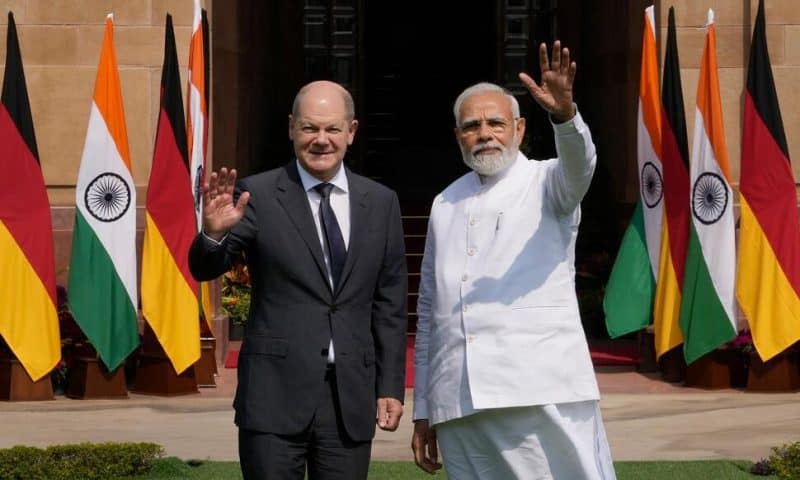German Chancellor Olaf Scholz sought assurances Saturday from India that it would support, or at least not block, Western efforts to isolate Russia for waging a devastating war against Ukraine
NEW DELHI — German Chancellor Olaf Scholz sought assurances Saturday from India that it would support, or at least not block, Western efforts to isolate Russia for waging a devastating war against Ukraine.
Following his talks with Indian Prime Minister Narendra Modi, Scholz stressed that developing countries were being negatively impacted by energy and food shortages resulting from the war and hopes that India will help secure critical supplies to Asia, Africa and the Americas.
Modi maintained his cautious approach and said India wanted the conflict to be ended through dialogue and diplomacy. “India is ready to make its contribution to any peace initiative,” he added.
He has refrained from any overt criticism of Russia as Moscow is a major supplier of arms, oil and India’s other economic needs.
Scholz said that Russia’s war against Ukraine “violated the fundamental principle to what we all agree of not changing borders through the use of violence.”
While the two leaders took no questions from the media after their meeting, Scholz later told German reporters that he and Modi had discussed the war in Ukraine “very extensively and very intensly,” but declined to elaborate, citing the confidential nature of the talks.
Scholz, who arrived in the Indian capital on Saturday, also discussed with Modi ways to boost economic cooperation, including through a free trade agreement between the European Union and India. Scholz made clear he favors a free trade deal and said he “personally will make sure that (the talks) do not drag on.”
The trip is Scholz’s first official visit to India, though it is his fourth meeting with Modi since taking office in 2021, underlining Germany’s interest in reaching out to Delhi.
“There is huge potential for intensified cooperation in sectors such as renewables, hydrogen, mobility, pharma and digital economy” with India, Scholz said in an interview published by The Times of India newspaper on Saturday.
After a videoconference with fellow leaders from the Group of Seven industrial powers on Friday, Scholz said before leaving Berlin that “internationally, we are endeavoring to make clear that Russia stands alone in the world with its aggression against Ukraine.”
Philipp Ackermann, the German ambassador to India, said he understands why India is buying large quantities of oil from Russia.
“That’s something that the Indian government decides and as you get it at a very, very low price, you know I cannot blame the Indian government for buying it,” New Delhi Television cited Ackermann as saying.
Germany has been pushing to diversify its economic relations as it and other European countries try to avoid being dependent on China, a German official said on condition of anonymity because he wasn’t authorized to talk to reporters.
Modi said the business delegation accompanying Scholz was firming up agreements with India in digital technology, the telecommunication sector and diversification of supply chains.
Scholz reiterated that Germany welcomes skilled workers from India, especially in information technology and software industries.
“We want to benefit from the Indian talent employed in Germany in the industrial sector,” he said.
Speaking to reporters later Saturday, Scholz said Germany could help India achieve its ambitious goals when it comes to expanding renewable power generation.
India is set to receive $10.5 billion in aid by 2030 to boost the use of clean energy under agreements the two sides signed in May last year.
Scholz’s delegation included several German business leaders, including the head of ThyssenKrupp, which is trying to sell further submarines to India.
Asked whether such a deal with India, which has been a major buyer of arms from Russia, could be struck, Scholz said he had “the impression that the quality of German technology enjoys great recognition and appreciate here.”
The two-day visit will also take Scholz to India’s information technology hub Bengaluru on Sunday.

